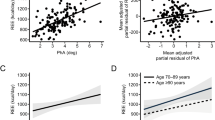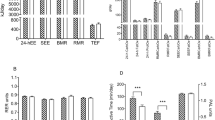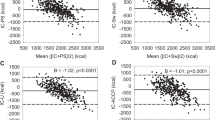Abstract
Objectives: Patients with congestive heart failure are often undernourished. The measurement of resting energy expenditure has served as the basis upon which estimates of daily caloric needs have been developed. Resting energy needs, however, in heart failure patients are unknown. We have developed a new equation to predict resting energy needs in heart failure patients that takes into account easily measured clinical variables and symptom severity. Design: Observational. Setting: Baltimore VA Medical Center. Subjects: Forty male patients with heart failure aged, 57–85 y; (27 Class II; 13 Class IV). Measurements: Resting metabolic rate was measured by indirect calorimetry, fat-free mass and fat mass by dual energy X-ray absorptiometry, peak VO2 by a treadmill test. Symptom severity was measured by the New York Heart Association classification. Ejection fraction, plasma albumin and plasma glucose were also assessed. Results: Stepwise regression analysis showed that body weight, fasting glucose, plasma albumin and New York Heart Association classification accounted for 83% of the variation in resting energy needs. The regression equation had a root mean square error of 130 kcal (544 kJ) per day. The equation is: RMR (kcal/d)=12.2 (wt, kg)+1.6 (glucose, gm/dl)+103 (NYHA; III, IV)−144 (albumin, mg/dl)+755. Moreover, prediction equations based on observations in healthy individuals significantly underestimated resting energy needs in heart failure patients. Conclusion: We offer a new equation to predict resting energy needs in heart failure patients based upon readily available clinical measurements. Further studies are needed to cross-validate our equation. Sponsorship: This work was supported in part by grants from the National Institute of Aging (AG-07857; KO4-AG00564) to (ETP), a predoctoral training grant from the National Institute of Aging (T32-AG00219) to (MJT), a minority supplement award to the Claude D. Pepper Older Americans Independent Center (P60-AG12583-02S1) at the University of Maryland to (TOO), and GCRC RR-109 at the University of Vermont. We would like to thank all volunteers who participated in this study. In addition, we thank Ms Gretchen Kairis, for her technical assistance and Dr SS Gottlieb, for referral of patients.
This is a preview of subscription content, access via your institution
Access options
Subscribe to this journal
Receive 12 print issues and online access
$259.00 per year
only $21.58 per issue
Buy this article
- Purchase on Springer Link
- Instant access to full article PDF
Prices may be subject to local taxes which are calculated during checkout
Similar content being viewed by others
Author information
Authors and Affiliations
Rights and permissions
About this article
Cite this article
Obisesan, T., Toth, M. & Poehlman, E. Prediction of resting energy needs in older men with heart failure. Eur J Clin Nutr 51, 678–681 (1997). https://doi.org/10.1038/sj.ejcn.1600462
Received:
Revised:
Accepted:
Issue Date:
DOI: https://doi.org/10.1038/sj.ejcn.1600462
Keywords
This article is cited by
-
A practical approach to estimate resting energy expenditure in frail elderly people
The Journal of nutrition, health and aging (2008)
-
The prediction of resting energy expenditure in type 2 diabetes mellitus is improved by factoring for glycemia
International Journal of Obesity (2002)



